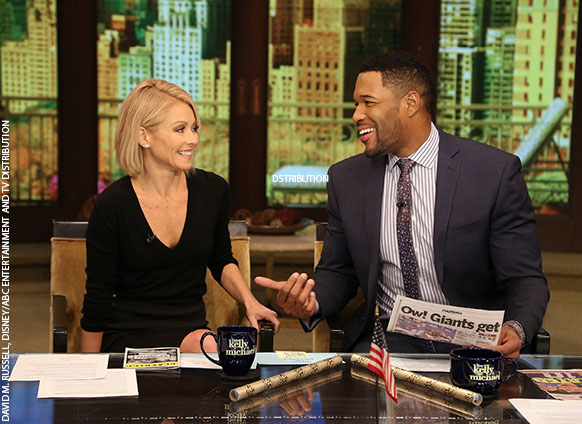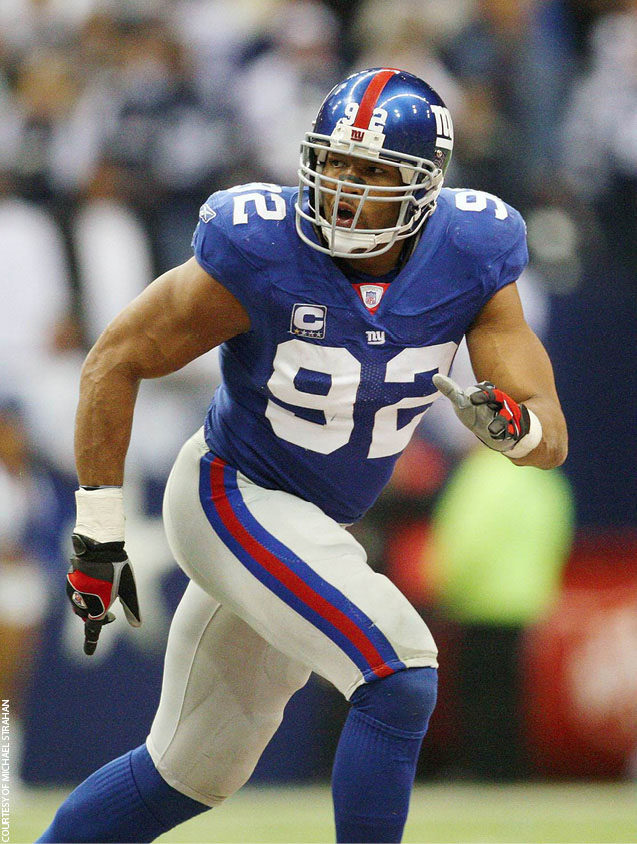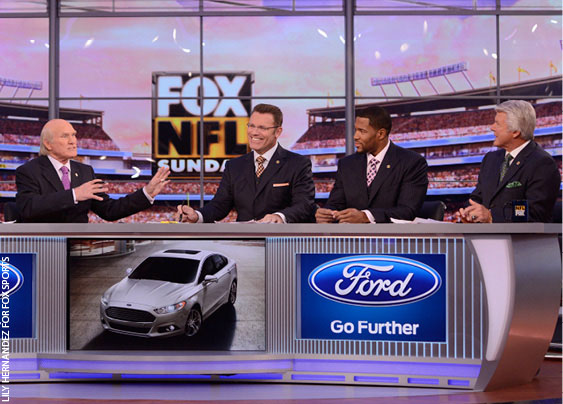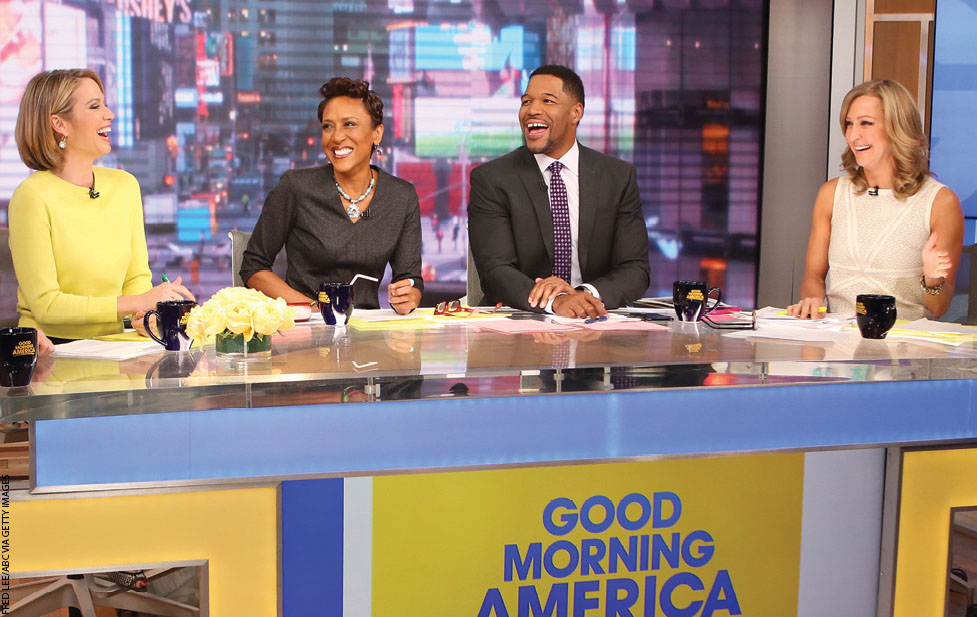In his first career, Michael Strahan was a legend.
He became one of football’s most relentless competitors, as good at bringing down quarterbacks as anyone who ever played. Week after week, he’d tear through opposing offenses like a man without fear. When he retired in 2008, after 15 years in one of the most punishing physical environments in sports, he celebrated by picking up three full-time jobs.
“To be honest, I’m looking for a few more,” Strahan says with a big Strahan laugh. “My afternoons are free.” He’s kidding. I think.
It’s 40 minutes after a Tuesday morning taping of Live with Kelly and Michael, and Strahan has chatted with Kelly Ripa about dirty martinis, interviewed actress Rebel Wilson and concocted a small buffet of Super Bowl snacks. Now he’s headed to the offices of his production company, SMAC Entertainment, where he’ll spend the rest of today. Tomorrow, he’ll be up early for a double-shot hosting Live and Good Morning America, which he joined just over a year ago. And during football season, he’ll follow GMA by flying straight to the West Coast to prep for Fox NFL Sunday, which starts before dawn and eats up all of this day of “rest.” Afterward, it’s back to New York to start the cycle again.

It sounds like a lot because it is a lot. And it needs to be. Strahan is pulling off an unprecedented second-career transition from football to entertainment. As a player, he set the record for most sacks in a single season in 2001, led his New York Giants to a Super Bowl upset of the then-undefeated New England Patriots in 2008, and earned a spot in the Pro Football Hall of Fame in 2014. He became the gold standard by which terrifying defensive ends were measured, and he maintained that spot for years. Now he’s riffing about cocktails and the Pitch Perfect movies, and he’s demonstrating a deft touch with sweet potatoes.
There’s more. He’s hosting a revival of The $100,000 Pyramid, a 10-episode run that shoots in New York in April and premieres this summer. Last year, he launched his own clothing line, which is available at J.C. Penney. Nine years removed from the routines of the NFL, he still keeps his body in performance shape. Most important, he’s father to four kids, including a set of 11-year-old twin girls.
“It’s crazy,” he admits, “but I don’t look at it that way. I don’t think about it. I just do it.”
In fact, as he writes in his hybrid memoir/personal development book Wake Up Happy (oh right, he wrote a book, too), that schedule, which would flatten a significant percentage of the population, is not only sustainable. It’s invigorating. “I like to accomplish things,” he says with that characteristic ability to simplify. “I look at football and what I had to go through to make it there. And I think to myself, How could I complain about my schedule now? I feel very fortunate to have these opportunities. They make me want to prove that I’m capable.”
On all three shows, Strahan cuts an imposing figure. He’s still at his football weight—6-foot-5 and 250 pounds, though he says the pounds are a lot more evenly distributed now. He’s more recognized in public from TV than he ever was as an athlete. “I take that as a compliment. There’s nothing better than to have fathers and sons know you from football, and mothers and sisters and grandmothers know you from daytime TV. It’s the best of both worlds.”
And his ratings are going up. In January, Live tied Dr. Phil as the No. 1 syndicated talk show with women 25-54 and virtually tied it for No. 1 in households and total viewers. More good news: The show’s been renewed through 2020. “He’s a combination of Will Smith and Muhammad Ali,” says Howie Long, also a Hall of Fame defensive end and co-host of Fox’s NFL coverage since its inception in 1994. “He’s likable, talented and entertaining. But he can also switch to being this ultra-competitive guy.”
Indeed, with those kinds of numbers it’s easy to forget that Strahan was considered a monster longshot for the Live job. Lots of people queued up to doubt him—including Strahan himself. “I doubt myself more than anybody else will ever doubt me,” he says, a theme that echoes throughout his book and his history.
But it’s a testament to his work ethic—and what he’s been able to do with that doubt—that he not only earned it, but turned it into a successful career path that’s been attempted by exactly one person in TV history. “If you do hard work,” he says simply, “a lot of good things go your way.”
***
By any measure, Strahan’s road to the NFL was a curious one. To start with, it begins in West Germany, where his military family moved when he was 9. The youngest of six kids, Strahan found himself on the receiving end of the brotherly nickname “Bob,” which was innocuous enough until he discovered it stood for “Booty on Back.” Loosely translated, it meant his brothers thought he was fat. He was 13.
“I was crushed,” he writes in Wake Up Happy. “What am I going to do?” he asked his dad. “‘It’s a simple formula,’ my dad said. ‘But it’s not an easy one. You’re going to have to eat a whole lot less. And you’re going to have to exercise a whole lot more.’ ”
So in perhaps the first recorded instance of a pattern he’d maintain over the next 30 years, Strahan broke through the disappointment and went to work. His mom, whom he credits with conjuring up a seemingly unending series of unbeatable meals and desserts (do not read his book while hungry, especially if you have a thing for German chocolate), backed him up. His father, whom he credits as often as he can for pouring the foundation of Strahan’s drive and dedication, helped him design his routines. Strahan would get home from school and launch into a routine that involved—of all things—a Jane Fonda VHS workout tape. He might not have been the most limber of kids, but he wasn’t going to be outworked.

The process helped him hone his natural athleticism, and before long his father noticed a developing football talent. But the first serious step to a football career was a scary one: It would take him back overseas to Texas, where Strahan’s uncle, journeyman NFLer Art Strahan, would help nurture him at Westbury High School in Houston. Germany was his whole world at that point, and the move would detach him from his family, girlfriend and the life he’d known. But it would also instill in him a sense of when to spot an opportunity. The doubts were there. But, as he writes in Wake Up Happy, he knew what a football scholarship would mean. “A free ride at college and maybe even a chance at the pros. I owed it to my parents. I owed it to myself to give it five months and try it out.”
From there, things moved fast. Strahan played football for Texas Southern University, where he grew so dominant that he routinely drew double teams in a strategy that opposing coaches christened, the “Strahan Rules.” He was drafted in 1993 by the Giants, where he established himself as the league’s pre-eminent defensive monster throughout the late ’90s and early 2000s. He captained the team that knocked off Tom Brady in one of the grandest upsets in Super Bowl history. And then, with the fresh ring on his hand, he retired, closing down a career that ended with 141.5 career sacks—good for fifth all-time. “Michael will not only go down in history as one of the greatest Giants players but perhaps their greatest leader as well,” says Ken Palmer, who’s served as editor of The Giant Insider magazine for the past 20 years. “There’s not one member of that 2007 Super Bowl championship team who believes they would have knocked off the Patriots without Strahan on the field and in the locker room. There hasn’t been close to as dominant a defensive end since he retired.”
This morning, he is crushing a segment about hummus and sweet potato fries.
***
It’s a little over halfway through the Live show. Strahan has already spent time riffing with Ripa about Mario Batali’s restaurant and is currently live-cooking a skillet of healthy snacks. (“I know it doesn’t look good, ma’am, but when I give you some at the commercial break, you’re gonna be begging for my phone number,” he cracks to an audience member.) He smiles easily as he seasons some nachos. When he does it, it doesn’t look like work.

That’s the trick, though, and a big part of how Strahan landed the Live gig. Tons of football icons have gone on to carve out bright second acts for themselves, many of them in broadcast. On Fox, Strahan has been flanked for eight years by Long, Terry Bradshaw and Jimmy Johnson. Others, like workout buddy Terry Crews (Brooklyn Nine-Nine), have gone into acting. But many of those guys were parlaying their gridiron personas into entertainment. They were still attached, in some regard, to football. Strahan started that way, too, in such instances as a Subway campaign ad that featured his trademark grin and the slogan “mind the gap.” Not a lot of athletes would take a seeming liability like that—the space between his two front teeth—and own it. This was one of the earliest public instances of his versatility.
“Football is a great training ground for the rest of your life,” says Long. “The lessons you learn—discipline, sacrifice, hard work, teamwork—epitomize who Michael is. He’s very driven and has a tremendous need to continue climbing that mountain. But in many ways football prepared him for where he is now, and how he handles it.”
Strahan had a lot to handle. The chair next to Ripa was one of the most coveted plots of real estate on television, and Live spent a full year auditioning 59 guest hosts for it, including more traditional-TV options such as Neil Patrick Harris, Seth Meyers, Kristin Chenoweth and Katie Couric. There were lots of arguments, internal and external, private and sprayed all over the media, against Strahan actually getting the job.
But, as legend has it, Strahan secured his spot with his singular stew of charisma, work ethic and a striptease: To help Channing Tatum promote the first Magic Mike, Strahan performed a full-on dance routine with Tatum that ended with the NFL’s sack master ripping off his pants and more or less shocking the audience and Ripa forever. (Strahan later had a cameo in Magic Mike XXL.)
Landing the gig was another example of Strahan facing doubts and crushing them (though this was the first example involving tear-away pants). Over the years he’s learned to thrive on turning doubts into fuel for his fire. That’s something he learned on the football field. But it translates to TV and life.
“In football you’ve got people who say you can’t do this, you can’t do that,” he says. “In a lot of ways, it’s the same thing that drives me now. At a different time in my life I might have said no [to the Live job], wouldn’t have even tried it because I was afraid to fail. I’m still afraid to fail, but now I’m not afraid to give it a go and see if it works and everything I’ve tried has worked pretty well.”
He’s tried a lot of things. In addition to the TV shows, he owns SMAC with his longtime partner, Constance Schwartz. He appeared in the short-lived ABC sitcom Brothers. Last year, he launched Collection by Michael Strahan, a line of menswear available at J.C. Penney. (An athleisure line, MSX by Michael Strahan, will be available just before Father’s Day.) And the Strahan-helmed reboot of The $100,000 Pyramid will launch this summer. Rob Mills, senior vice president of alternative series, specials and late night programming for ABC, says that the list of potential Pyramid hosts pretty much started and ended with Strahan. “It was a no-brainer,” Mills says. “As fierce as he was on the field, when you saw him in those Chunky soup commercials or in the locker room, there was this feeling of ‘This guy is your friend.’ And in a game show like Pyramid, you’ve gotta be reassuring to the players, but you’re also running a sporting event. He’s a perfect melding of the two.”
Strahan has a number of natural advantages for achieving all of these things, and the first is probably his memory. He ascribes that to being the youngest of six kids, where observation was key to attention and survival. He also credits the Giants, who made him study a 6-inch-thick playbook in training camp and plucked out particular pages in practices and on game days. “In football, you have to adjust without a second thought,” he says, “You have to remember that blitz, that call.” He claims a photographic memory for sacks, which is considerable when you count up how many he has to remember.
But Strahan mostly works off the cuff for three shows every week during football season, without any formal research. He learns as he moves. “I really don’t think I’m any different from anyone else. It’s just listening to people, having conversations, picking it up day to day. When I see something, I generally don’t forget it,” he says, laughing. “Thank goodness a lot of those football shots didn’t take hold.”
The second natural advantage is his attention to detail, born into him and reinforced during his days in Germany. “It’s the little things,” he says. “When I’m done with GMA and get to Live, I make sure I change my entire outfit. Shoes, socks, tie, shirt, everything. You don’t want someone to look and go, ‘Man, I saw him wearing the same thing!’ That’s lazy to me. It’s very important in whatever job I do to be 100 percent present.”
His third advantage is the knowing when to be zero-percent present: When he’s off, he’s off. “One of the things this job has taught me is that you’ve gotta get away,” he says. “You can’t constantly be on your phone, connected to people. You have to have a point where you’re away. And I’m not talking about a few hours. I mean for a week or two.”
Before, he says, he’d go to bed with the ringer on “like I was a doctor waiting for a call.” Now he turns off the TV. “You start watching, then a little more, then a little more,” he says. “There’s nothing on that I can’t watch tomorrow, you know? And it’s helped me be more present with my kids, and that’s the most important thing.”
He has another responsibility, too. Strahan knows that he’s now a role model for anyone looking to make mid-career adjustments, or early-career adjustments, or really any kind of change at all. He wants to show that change is not only possible but necessary, no matter how many people are whispering about how you might not be right for the job. “People seem to think that once you do one thing well, that’s the only thing you can do and there are people out there who are so talented, who can do multiple things. Hopefully, by seeing what I’m doing, people might take a chance on something that doesn’t seem conventional for them. You can change. You can be anything.”
***
The unconventional didn’t always come easy. Strahan writes in Wake Up Happy that his primary motivator has remained the same since he was a boy: a looming and lively fear of failure. That’s why, when he started each of his three shows, he was nervous as hell.
On the surface this seems profoundly unlikely. Strahan was a football savant. The idea of him getting nervous going on football TV to talk football with other football guys is not one that automatically clicks.
But Strahan says that fear is unrelated to achievement—he’s competed at the highest level and won. Rather, it’s something that he fights regardless of which field he’s currently on. In that respect, he says, his battle is universal. It’s a version of the impulse that compelled him to pop in Jane Fonda tapes.
“Everybody feels the doubt,” he says. “I’d have a great game, but only remember the bad plays. That’s how I still am in a lot of ways. And I think that drives me more than anything.”

The goal isn’t to be perfect, of course. It’s simply to be as good as he can, every time. “The great thing about these jobs is you get the opportunity the next day to get up and be better. You don’t have to wait a week. When you have bad days, you don’t let them stick with you. You have to get back on the horse and make sure the next day is the best you can do.”
To help that along, he’s sharpened his gifts as a fast learner, partly because of that fear and partly because that’s what he does. “I don’t want to hold anybody back. I try to accelerate my learning curve to the point where people can feel like I belong. GMA was a great example of that. Joining that team was absolutely one of the scariest things I’ve ever done. Being on with Kelly is scary.”

Even the Fox show, he says, was initially intimidating. “I joined a team that had done very well without me,” he says. “I didn’t want to be the guy who slowed them down. When I first started, I would say something, look at Jimmy when we went to commercial and say, ‘Did anything I just said make any sense at all?’ I had all these thoughts in my head, but I don’t know how they came out of my mouth, and under the table my leg was shaking like a dog’s tail. I looked calm and collected, but it took years to get over that.”
It also took effort. As he’d done on the field and before, Strahan got over his anxiety by turning his discomfort into productivity. He started amplifying his studies, looking at his teammates and competitors, picking up what he could and discarding that which he didn’t need. “I’m constantly studying, because I don’t ever think that I have it. That’s where you have to guard yourself. It’s like golf—once I think I got it I go out and play the worst round of my life,” he says.
Strahan adjusts by not watching himself at all. “It makes me think too much. When I’m at Fox, I’m watching how each of these guys deliver their words, how Terry uses humor, how Jimmy brings the coach’s point of view, how Howie can be technical. I’m just watching how they deliver it, how they look into the camera, how they look off-camera, their body language. Everything.”
For his part, Long says Strahan was a natural. “With Michael, what you see is what you get. I call it the Saran Wrap factor: People can see right through to who you are,” Long says. And he fit into the close-knit group easily. “I don’t think we could have computer-generated a better guy. There’s mutual respect, trust and—dare I say—a great deal of feeling for one another. We laugh from 5 a.m. until 5 at night. It’s like a locker room without the physical toll.”
On Live, that studying means Strahan is watching Ripa’s preternatural gifts for dealing with guests and the audience. “She can turn something that might seem boring into the funniest story about washing your clothes you’ve ever heard. And at GMA I’m watching everybody deliver into the camera, bringing energy to certain words and making their statements pop.”
All that studying not only helps him feel grounded, it reinforces a lesson he learned in the NFL: How to be part of a team. “Everyone thinks because you’re on a show that you’re totally confident. It looks easy,” he says. “Far from it. It’s a constant evolution until you figure out how you fit in. How can I keep my personality and my strengths but make them vibe with everybody else’s? That’s the great thing I learned from football: It’s not all about you, it’s about what you do to help everybody else succeed. If the team is winning, I’m winning.”
And if you’re winning, you know when to take a breath and enjoy it. “Play it by ear, go by your gut and do what you feel is right,” he says. “That’s the only way to have a happy life.”
Related: Michael Strahan’s ‘Dream Big, Win Big’ Guide to Transforming Your Life
Michael Strahan is featured in the May 2016 issue of SUCCESS magazine, on newsstands April 12.









